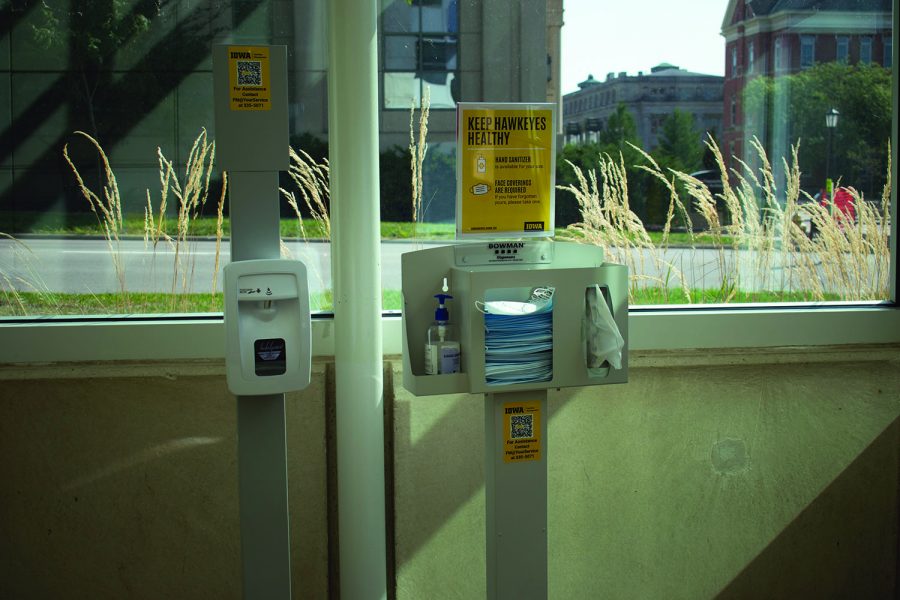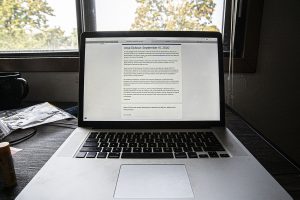The cost of University of Iowa COVID-19 preparations
University of Iowa faculty, staff, and students have access to free coronavirus testing through the university. Despite not having to pay for the test, waiting periods and healthcare provider consultations can make testing expensive for some.
Masks, and sanitizer, and tissues are seen available in the Pomerantz Center on Tuesday, Sept. 15, 2020.
September 15, 2020
The University of Iowa offers free testing for students, faculty, and staff if they are symptomatic or have a known exposure to someone who has tested positive for the coronavirus. However, with a consultation before the appointment, testing can be expensive.
The UI released in its latest COVID-19 campus update that as of Sept. 11, there have been 1,804 self-reported coronavirus cases among students and 27 among employees since the beginning of the semester. As the coronavirus continues to spread, more people are looking for ways to get tested.
Director of Student Health Paul Natvig said the UI offers free testing for students, faculty, and staff, but they must complete a telehealth video call beforehand with a health-care provider to determine whether they need a test. UI Campus Health Officer Dan Fick said a test costs the university $100, The Daily Iowan previously reported.
Natvig said if someone has health insurance through the university, the telehealth video session doesn’t cost them anything. He said UI Student Health will charge someone’s insurance, but the individual student will not incur charges.
For students, faculty, and staff members who don’t have insurance through UIChoice, UISelect, Student Health Insurance Plan, and UIGradcare, Natvig said they are required to pay their copay from an outside insurance agency or pay the full amount out of pocket.
UI Vice President of External Relations Jeneane Beck said the university offers financial assistance to those who can’t afford to pay for the testing.
“Students who are unable to afford the test can seek assistance with payment,” Beck said. “Additionally, Student Health can submit the test to the State Hygienic Laboratory at no cost.”
During the telehealth video call, Natvig said a health care provider determines whether a person’s symptoms could be coronavirus. The health-care provider advises the person on whether or not they need to get tested, based on their symptoms and their known exposures to positive patients, Natvig said.
Beck said since the university is committed to testing everyone who needs it, there is no set budget limitation. Funding for testing comes from Student Health and the General Education Fund, she said.
“We rely on our students, faculty, and staff to provide accurate information about their health and any potential symptoms to their provider in order to ensure those who most need to be tested are able to be tested in a timely manner,” Beck said.
The number of tests distributed differs depending on the day. UI Student Health is administering between 100 to 500 tests per day, Natvig said.
While the university hasn’t set a limit on the amount of times a student can get tested for the coronavirus, they are limiting the amount of people who attempt to get tested again after testing positive, Natvig said.
Beck said the money for testing comes from the $218,710,793 General Education Fund budget, but the UI hasn’t set a limit on the budget for COVID-19 testing.
In addition to money spent on testing, the UI also purchased a significant amount of personal protective equipment to distribute on campus.
Assistant VP and Director of Business Services Deborah Zumbach said in an email to The Daily Iowan that the UI and UIHC invested an estimate of $ 22,481,000 in supplies to prevent the spread of COVID-19, such as PPE, hand sanitizer and plexiglass.
Zumbach said over Skype that her purchasing team buys supplies for both the UI Hospitals and Clinics and the university, so while the college wasn’t in need of supplies for students in the early months of the pandemic, the purchasing department has been working to secure supplies since March for UIHC.
When it came time to supply the UI campus, the purchasing department started by mimicking the hospital’s needs, Zumbach said. However, when they were in the market for supplies for the UI, they were limited in the vendors they could rely on, as some of their usual vendors were only allocating supplies to hospitals, she said.
She added that the purchasing department referred to a Centers for Disease Control and Prevention approved list and local experts when searching for alternative supplies, she said.
“We had to go and look for relationships and basically what happened is we had people come to us who were either alumni from the university or were connected to doctors at the hospital, who said, ‘Hey, we want to help you get a supply of masks and we have connections in China,’” Zumbach said. “And so, if we’re just talking about masks supplies alone, we built relationships directly with vendors in China via connections from our alumni.”
The UI purchasing team gained access to a COVID-19 Amazon website available to hospitals that only a few higher up universities had access to, she said. By engaging with Amazon, the UI purchasing department was able to buy 10 million three-ply masks for the state of Iowa, Zumbach said.
The purchasing department has also used its connections to sell masks to the University of Northern Iowa and Iowa State University, she said. As part of a bulk buy, roughly 20 schools in Iowa purchased face masks and hand sanitizer from UI. They sell at the cost value, UI is not making a profit.
The UI received $16.17 million from the CARES Act in fiscal 2020 and 2021, half of which would go toward preventing, preparing for, and responding to COVID-19, and covering costs associated with changes to the delivery of instruction due to COVID-19, according to Board of Regents documents.
Editor’s note: a previous version of this story misparaphrased a quote from Vice President for External Relations about expectations for students to report test results honestly. The story has been updated to reflect her comments. The DI regrets the error.






